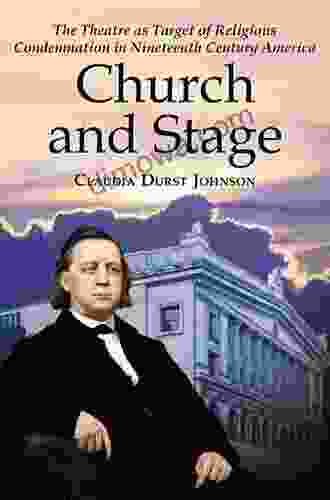The Theatre: Target of Religious Condemnation in Nineteenth Century America

In the bustling cities and towns of 19th century America, the theatre emerged as a vibrant and alluring form of entertainment. Its stages showcased captivating performances, from comedies that elicited laughter to tragedies that stirred profound emotions. However, beneath the glimmering façade of footlights and applause, the theatre faced a formidable adversary: religious condemnation.
5 out of 5
| Language | : | English |
| File size | : | 7314 KB |
| Text-to-Speech | : | Enabled |
| Enhanced typesetting | : | Enabled |
| Word Wise | : | Enabled |
| Print length | : | 222 pages |
| Screen Reader | : | Supported |
Pulpit Thunder and Moral Outrage
America's religious landscape was dominated by evangelical Protestantism, whose adherents believed in the strict adherence to biblical principles. Many of these devout individuals viewed the theatre with a mixture of apprehension and disdain, denouncing it as a den of vice and corruption.
From their pulpits, fiery preachers thundered against the evils of the stage. They condemned actors and actresses as immoral and depraved, and accused theatregoers of indulging in sinful pastimes. One sermon, delivered by the influential Reverend Lyman Beecher, proclaimed that "the theatre is the school of vice, the nursery of profligacy, and the hot-bed of pollution."
Legislative Battles and Censorship
The pulpit thunder did not remain confined to the walls of churches. Religious leaders sought to translate their moral crusade into political action, urging lawmakers to pass legislation that would restrict or even ban theatrical performances.
In cities like Boston, Philadelphia, and New York, ordinances were enacted that imposed fines and imprisonment upon those who dared to put on or attend plays. These laws were often vague and open to interpretation, giving local authorities broad powers to suppress any performance they deemed objectionable.
The theatre community fought back against these attempts at censorship. They argued that freedom of expression was a fundamental right guaranteed by the Constitution, and that the theatre served a valuable role in society by providing entertainment, promoting cultural exchange, and stimulating critical thinking.
Social Reform and Shifting Values
The conflict between the theatre and religious groups was not merely a battle of opposing ideas. It reflected deeper social and cultural tensions that were shaping 19th century America.
Industrialization and urbanization brought profound changes to American society. Traditional values and moral codes were challenged by new lifestyles and ideologies. The theatre, with its portrayal of unconventional characters and exploration of controversial themes, became a lightning rod for the anxieties and fears of a society in transition.
The Decline of Religious Opposition
As the 19th century progressed, religious condemnation of the theatre gradually diminished. Several factors contributed to this decline:
- Secularization: The rise of scientific rationalism and secular ideologies weakened the influence of traditional religious beliefs.
- Urbanization: The growth of cities created a more diverse and cosmopolitan population, which was less receptive to religious dogma.
- Professionalization of Theatre: The establishment of professional theatre companies and the of more sophisticated and artistic productions led to a greater respect for the art of the theatre.
By the end of the century, the theatre had become firmly established as a legitimate form of entertainment and cultural expression in American society.
Legacy and Significance
The conflict between the theatre and religious condemnation in 19th century America left a lasting legacy on both the theatre itself and American society as a whole.
The theatre emerged from this era as a more mature and respected art form, capable of tackling complex themes and challenging societal norms.
The struggle for freedom of expression and artistic freedom continues to shape the American cultural landscape today. The lessons learned from the religious condemnation of the theatre serve as a reminder of the importance of protecting these fundamental rights.
'The Theatre As Target Of Religious Condemnation In Nineteenth Century America' is a fascinating exploration of this pivotal chapter in American history, providing insights into the complex interplay between religion, culture, and social change.
5 out of 5
| Language | : | English |
| File size | : | 7314 KB |
| Text-to-Speech | : | Enabled |
| Enhanced typesetting | : | Enabled |
| Word Wise | : | Enabled |
| Print length | : | 222 pages |
| Screen Reader | : | Supported |
Do you want to contribute by writing guest posts on this blog?
Please contact us and send us a resume of previous articles that you have written.
 Book
Book Novel
Novel Page
Page Chapter
Chapter Text
Text Story
Story Genre
Genre Reader
Reader Library
Library Paperback
Paperback E-book
E-book Magazine
Magazine Newspaper
Newspaper Paragraph
Paragraph Sentence
Sentence Bookmark
Bookmark Shelf
Shelf Glossary
Glossary Bibliography
Bibliography Foreword
Foreword Preface
Preface Synopsis
Synopsis Annotation
Annotation Footnote
Footnote Manuscript
Manuscript Scroll
Scroll Codex
Codex Tome
Tome Bestseller
Bestseller Classics
Classics Library card
Library card Narrative
Narrative Biography
Biography Autobiography
Autobiography Memoir
Memoir Reference
Reference Encyclopedia
Encyclopedia Starr Meade
Starr Meade Walt Garrison
Walt Garrison Alexandra Moody
Alexandra Moody Stanley Bashkin
Stanley Bashkin Vance T Holliday
Vance T Holliday Atticus Lee
Atticus Lee Rosalee Adams
Rosalee Adams K A Linde
K A Linde Dori Pulitano
Dori Pulitano Tonya Leslie
Tonya Leslie Minute Help Guides
Minute Help Guides Grace Given
Grace Given William Ma
William Ma Lisa Cach
Lisa Cach Walter A Harrison
Walter A Harrison Victor Allenspach
Victor Allenspach Sunanda J Chatterjee
Sunanda J Chatterjee William Wilberforce
William Wilberforce Anu Singh Choudhary
Anu Singh Choudhary Erik Lawrence
Erik Lawrence
Light bulbAdvertise smarter! Our strategic ad space ensures maximum exposure. Reserve your spot today!

 Bryan GraySoar Through the Galaxy: Embark on an Epic Adventure with Poe Dameron in Free...
Bryan GraySoar Through the Galaxy: Embark on an Epic Adventure with Poe Dameron in Free...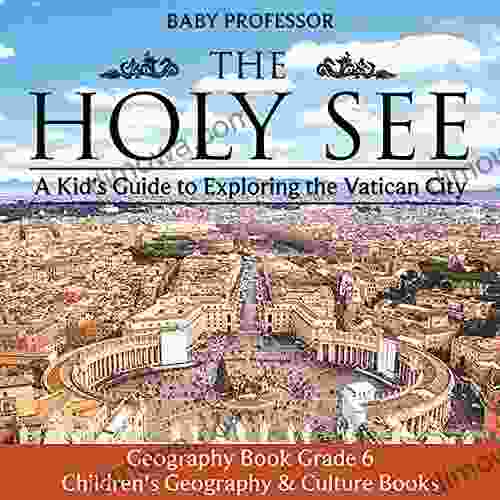
 Donovan CarterKid's Guide to Exploring the Vatican City: A Geography Adventure for Children
Donovan CarterKid's Guide to Exploring the Vatican City: A Geography Adventure for Children Chris ColemanFollow ·5.7k
Chris ColemanFollow ·5.7k Jeffrey HayesFollow ·7.4k
Jeffrey HayesFollow ·7.4k Tennessee WilliamsFollow ·6.4k
Tennessee WilliamsFollow ·6.4k Gabriel HayesFollow ·15.7k
Gabriel HayesFollow ·15.7k Fernando BellFollow ·14.5k
Fernando BellFollow ·14.5k Gabriel BlairFollow ·7.1k
Gabriel BlairFollow ·7.1k Andy ColeFollow ·12.2k
Andy ColeFollow ·12.2k Jacob FosterFollow ·12.3k
Jacob FosterFollow ·12.3k
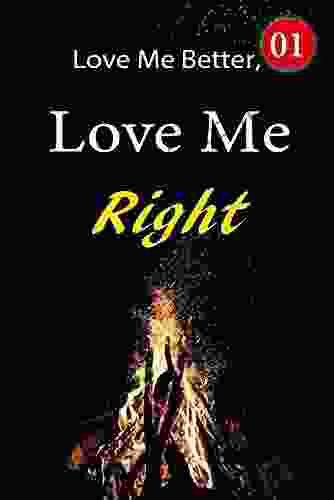
 F. Scott Fitzgerald
F. Scott FitzgeraldLove Me Better, Love Me Right: A Journey of...
Unveiling the Profound Power of Emotional...

 Eddie Powell
Eddie PowellHow To Make Your Muzzleloader Most Effective And Keep It...
In the realm of firearms, muzzleloaders hold...
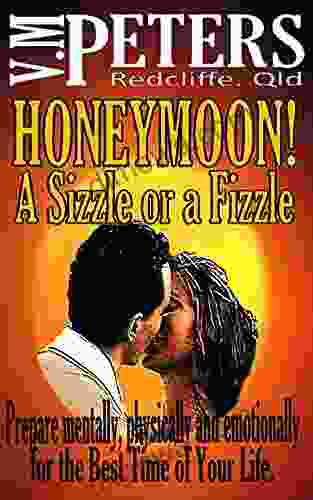
 Andy Hayes
Andy HayesPrepare Mentally, Physically, and Emotionally for the...
Embark on a Transformative Odyssey to...
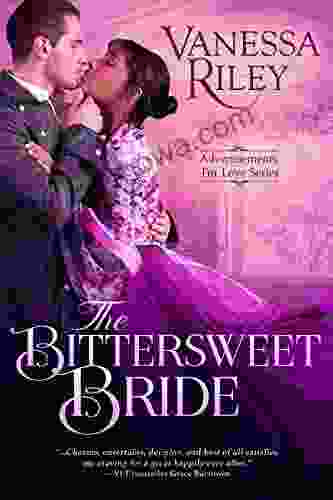
 Oliver Foster
Oliver FosterThe Bittersweet Bride: Advertisements for Love
A Poignant...
5 out of 5
| Language | : | English |
| File size | : | 7314 KB |
| Text-to-Speech | : | Enabled |
| Enhanced typesetting | : | Enabled |
| Word Wise | : | Enabled |
| Print length | : | 222 pages |
| Screen Reader | : | Supported |


